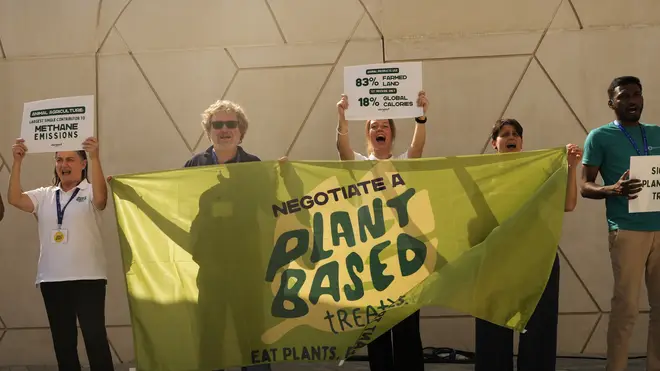
Clive Bull 1am - 4am
9 December 2023, 15:24

Seasoned observers including a former Irish president have hailed signs that the oil cartel is circling the wagons during the climate talks.
The oil industry is starting to sweat as United Nations climate talks heat up and threaten to plug wells for good, veteran negotiation observers have said.
A reported letter from Opec’s leader pleading with the oil cartel’s member countries to block any language in an agreement at the climate talks that would phase out or phase down fossil fuels has rocked negotiations in Dubai.
Host and fellow petrostate United Arab Emirates is trying to curb the letter’s reverberations in a process where one or two key nations can block any measure.
Environmental activists, smarting from 30 years of soft power from oil interests keeping such discussions from seeing the light of day, were cheered by signs that the cartel is circling the wagons.
Unite. Act. Deliver. 🌍 #COP28UAE https://t.co/YR2tDT25XJ
— COP28 UAE (@COP28_UAE) December 9, 2023
“I think they’re panicking,” said E3G analyst Alden Meyer. “Maybe the Saudis can’t do on their own what they’ve been doing for 30 years and block the process.”
Former Irish president Mary Robinson said: “They’re scared. I think they’re worried.”
Ms Robinson, co-chair of the retired leaders’ group The Elders and a prominent climate campaigner, said the fact that Opec is concerned “gives me hope”.
Last month, she clashed publicly with the president of the Cop28 negotiations, Sultan al-Jaber, who is also chief executive of the Emirates’ national oil company.
Germany’s climate envoy, Jennifer Morgan, suggested any call for blocking a deal would be felt most by small countries vulnerable to sea level rise caused by global warming.
“Right now, countries here are fighting for their lives. The small islands, and most countries here, are engaging very actively on this discussion in a real way,” she said in an interview.
“And I think it is obviously not responsible to have a position that could mean – would mean – the life and death of many (millions of people).”

She added: “When I listen to the small islands who are in my ear and in my heart, and then I hear about this Opec letter, I’m deeply concerned about it.
“We’re seeing very worrying tactics by the Arab groups here.”
Cop28 director general Majid al-Suwaidi downplayed the Opec letter, saying the UAE team running the climate conference has been meeting with negotiators to get an ambitious deal.
He said the oil cartel is a different entity to climate negotiations, even though the letter was about the talks themselves.
“I feel confident that we’re going to get a good result you’re going to be surprised about,” Mr Suwaidi told The Associated Press.
The conference presidency has been crowing about deal after deal, many of them involving hundreds of millions or even billions of dollars of pledges, but they have only nibbled the edges of the key issue of cutting emissions.
When it comes to reducing the gases that cause climate change, a key group of scientists who analyse pledges, actions and potential temperature increases said in a report on Saturday that all the action so far has not amounted to much.
Climate action doesn't happen without the voices of Indigenous Peoples. Listen. Learn. Act. #COP28 #UniteActDeliver pic.twitter.com/RvzZWiEodO
— COP28 UAE (@COP28_UAE) December 9, 2023
Climate analytics chief executive Bill Hare, co-author of the report, said: “The Cop28 presidency has made a very big deal about a whole lot of voluntary initiatives, while adopting an ambiguous and weak position on the central issue of a fossil fuel phaseout.”
The controversy came as protests at the conference centre in Dubai were set to intensify, with a “Global Day of Action” urging nations to move decisively to stop climate change. The Opec letter has added fuel to their fury.
A speedy phase-out of fossil fuels has shaped up as the central issue at the talks as they head into their final days. Activists and experts have warned that the world must quickly reduce use of the oil, gas and coal that is causing dangerous warming.
Mohamed Adow, director of Power Shift Africa, called the December 6 letter from Opec secretary-general Haitham Al Ghais “shameful”, and said “the writing is on the wall for dirty energy”.
Mr Adow said: “The reality is if the world is going to save itself, it cannot be held back by a small band of countries that control the world’s oil supply.
“Fossil fuels keep power in the hands of the few that happen to have them. Renewables give energy to anyone with a solar panel or a wind turbine.”
Negotiators are fleshing out language in a key document called the Global Stocktake. It will say how much progress the world had made since the 2015 Paris agreement – where nations agreed to limit warming to 1.5C since preindustrial times – and what it has to do next.
New proposed language on how to curb warming released on Friday afternoon strengthened the options for a phase-out of fossil fuels that negotiators could choose from. Four of the five options call for some version of a rapid phase-out.
Earlier, Mr Adow had been among environmental advocates who had some qualified optimism about the expanded 27-page draft language.
“The bare bones of a historic agreement is there,” he said.
“What we now need is for countries to rally behind the stronger of the options and strengthen them further.”